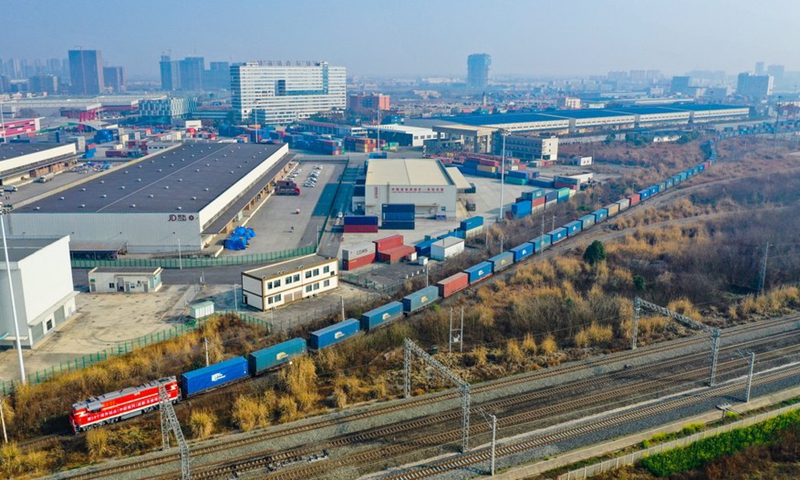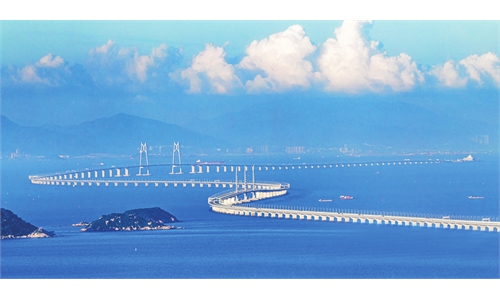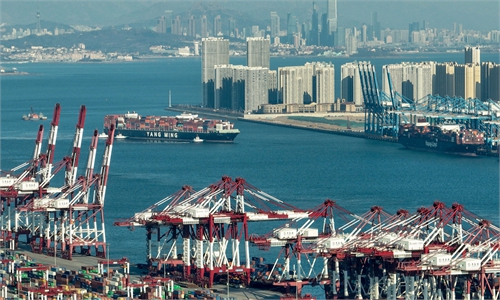
Aerial photo taken on Feb. 21, 2021 shows the first China-Europe freight train linking St. Petersburg of Russia with Chengdu departing the Chengdu International Railway Port in Chengdu, southwest China's Sichuan Province. Photo: Xinhua
Bilateral trade between China and Russia in 2022 rose 34.3 percent year-on-year to a record high of 1.28 trillion yuan ($190 billion) in yuan-denominated terms, Chinese customs data showed on Friday, maintaining a robust growth momentum which observers said is backed by deepened relations, a surge in energy trade and a further release of potentials in the two economies' complementary bilateral trade ties.
It marked the first time that bilateral trade has surpassed the 1-trillion-yuan threshold. In the breakdown, China's exports to Russia soared 17.5 percent year-on-year, while imports from Russia jumped 48.6 percent year-on-year, customs data showed.
The 34.3-percent growth rate also accelerated from the 26.6-percent increase recorded in bilateral trade in 2021. It also compared with a 7.7-percent expansion rate for China's overall foreign trade last year.
In total, the two countries' bilateral trade accounted for 3 percent of China's trade volume last year, spokesperson of China's General Administration of Customs L ü Daliang said at a press briefing held by the State Council Information Office on Friday.
"The slew of data underscores the healthy and sound growth in trade ties between China and Russia, amid vigorous developments in bilateral relations from political, security, economic to finance dimensions based on the comprehensive strategic partnership of coordination reached last year," Song Kui, president of the Contemporary China-Russia Regional Economy Research Institute, told the Global Times on Friday.
In April, Chinese and Russian leaders jointly set the goal of bilateral trade volume reaching $200 billion by 2024. Last year's trade figure means that the two countries are one step closer to hitting the milestone ahead of schedule.
According to Song, the upbeat trade data is lifted by strengthened energy cooperation and a gradual switch to yuan and ruble payment from dollar in bulk commodities trade, after Russia further scaled up natural gas, crude oil and coal exports to China amid Western unilateral sanctions against the country's energy products.
In 2022, Russia's natural gas exported to China via the China-Russia Eastern Gas Pipeline reached 15 billion cubic meters, and the volume is predicted to rise further to 22 billion cubic meters in 2023, according to state broadcaster CCTV.
Chinese exports in electronic products, manufactured products as well as high-end equipment to Russia also saw a significant rise last year, according to Song, which mirrors the complementary and interdependency economic relations between the two countries.
"There is plenty of room for further gains in 2023. For example, Russia has announced plans to build special economic zones in the Far East, which will elevate the country's mineral and agricultural exports to China," Song said.
In late December, Chinese and Russian leaders had a meeting via video link, signaling a good start for bilateral relations heading into 2023. During the meeting, China stressed that both sides should further make good use of existing mechanisms to push for progress in cooperation on economy, trade, energy, finance and agriculture.
As China downgraded COVID-19 response and reopened its borders on Sunday, major border ports between China and Russia including Manzhouli in North China's Inner Mongolia Autonomous Region have also witnessed an uptick in cargo transportation, which is also set to inject new vigor into bilateral trade in the new year, analysts said.
Global Times



